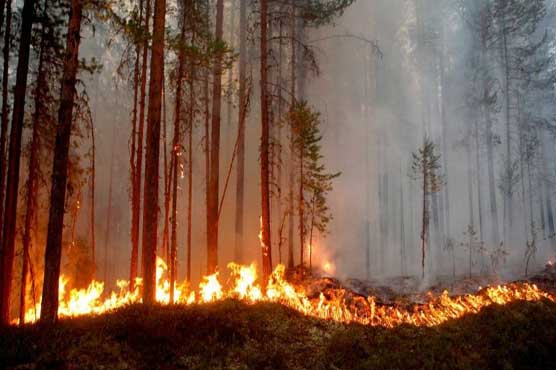Fires spark biodiversity criticism of Sweden's forest industry

Forests cover 70 per cent of Sweden�s territory.
STOCKHOLM (AFP) - The ferocity of wildfires in Sweden has sparked criticism against the powerful forest industry, which is being accused of having rolled out a "red carpet" for blazes and sacrificing the nation’s biodiversity for the sake of profit.
Forests, considered sacred in ancient Norse mythology, still cover 70 per cent of Sweden’s territory. They play an important part in its modern economy by supplying the raw material to make Sweden the world’s third largest exporter of paper, cellulose and wood products while employing 100,000 people.
The central province of Ljusdal is one of the worst hit areas by the fires. It is 95 per cent covered by forests and as in many northern regions, the forestry industry is vital for the local economy.
The possessors of the "green gold" are of high status and powerful: Sweden’s King Carl XVI Gustaf himself is a prosperous forest owner.
Controversy spread as fast as the wildfires when industry operators were criticised for their role in the crisis.
"Flat landscapes stretching long distances with closely situated pine forests are a red carpet for blazing storms and massive fires," writer Sven Olov Karlsson noted in a local newspaper column.
"Maybe it wasn’t so wise to get rid of leaf trees and create a monoculture of pine which can spread fire at 80 metres per minute."
‘Fire spreads no matter what’
Nearly all forests in Sweden are less than a century old. Described as "production forests", they are 83 per cent conifers whose tall height deprives other species of sunlight.
For Rolf Edstrom, spokesman for Norrskog, a forest owners association with over 12,000 members, "it doesn’t matter whether the forest is new or old, the fire spreads no matter what", after weeks of drought and scorching temperatures as high as 35 degrees Celsius (95 Fahrenheit).
According to Johan Sjostrom, a fire technology expert at the RISE Research Institute of Sweden, said wildfires are "very rare today because we extinguish them".
"We didn’t do that before because we didn’t have the same resources," he told the Swedish daily Dagens Nyheter.
Magnus Kindbom, director of forests at the influential Federation of Swedish Farmers, said "the entire forestry industry is generally working on increasing the amount of leaf forests."
But environmental protection associations are sceptical and argue for the protection of woodlands.
They claim the share of protected forest areas is as low as four percent while the industry says it’s as high as 25 per cent.
‘We are fighting money’
Non-governmental organisations warn that there are considerable challenges to ensuring biodiversity for plants and animals amid the fight against global warming.
One in 10 species in the country’s forests is on the red list of the Swedish Species Information Centre.
Rolf Edstrom said that the forest industry is aware of this and on the path to a "cultural revolution".
"Protected and ancient forests, bird populations, all the indicators are going in the right direction," he said.
But Lina Burnelius, who is responsible for forest issues at Greenpeace’s Sweden branch, disputes this claim and said the forest landscape is segmented.
"In order for species to survive, they have to live together with other species, and if we only have trees of the same kind and age, nothing can exist around it," she told AFP.
Neither can the reindeer in Lapland where Sami herders are fighting against the contorta pine.
An invasive species, the fast-growing pine trees are smothering vegetation on the reindeer’s grazing grounds, including lichen, the animal’s main source of food.
"The old forests that are still standing is partly thanks to us, but it is increasingly difficult," said Margret Fjellstrom, owner of hundreds of reindeer in Dikanas, a mountainous village located 800 kilometres (500 miles) north of the capital Stockholm.
"We are fighting against money," she said.
But for Magnus Kindbom of the Federation of Swedish Farmers, "the forest owners have the right to manage their property as they wish".

